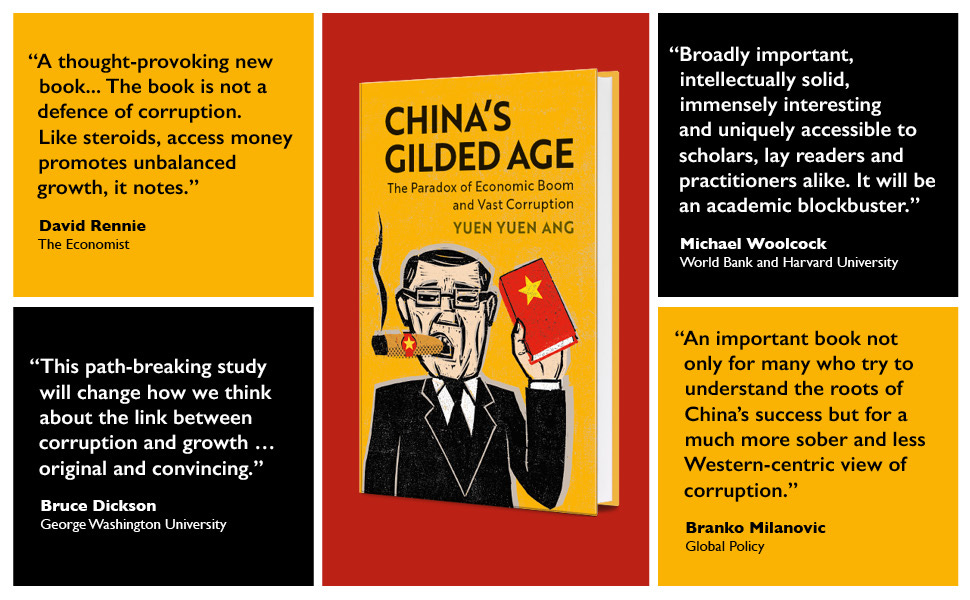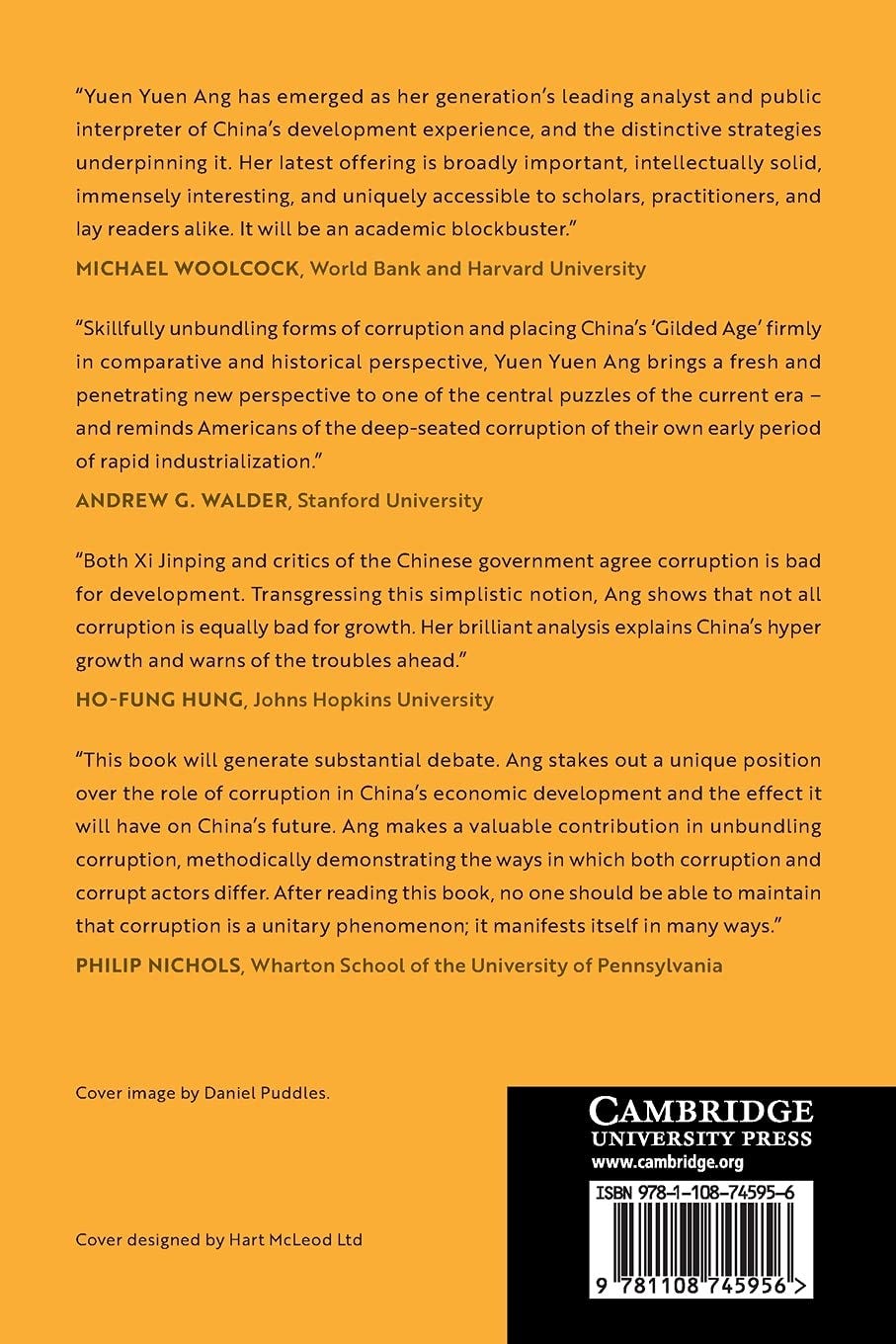Rural China Book of the Month (January 2025): “China’s Gilded Age: The Paradox of Economic Boom and Vast Corruption” by Yuen Yuen Ang
How corruption fuels growth, inequality, and the rural-urban divide in modern China.
What if the key to China’s economic miracle is not its strength but its flaws? Yuen Yuen Ang’s China’s Gilded Age: The Paradox of Economic Boom and Vast Corruption delves into this paradox, offering a fresh perspective on how corruption coexists with rapid economic development. While the book broadly analyses modern China, it offers vital insights into the systemic forces shaping rural life. Ang’s work is essential for understanding the hidden mechanics behind rural China’s marginalisation and its developmental challenges.
The Premise: Redefining Corruption
Ang challenges conventional perceptions of corruption, presenting it as a multifaceted phenomenon. She distinguishes between four types of corruption: petty theft, grand theft, speed money, and access money. Access money—the exchange of power for wealth through state-controlled resources—underpins China’s economic boom.
Unlike corruption, which hinders growth, access to money enables development, albeit unequally. Incentivised by performance metrics, local officials forge informal deals with businesses to spur economic activity. This system creates growth hotspots in urban and coastal regions while leaving rural areas to grapple with inequality, environmental degradation, and exploitation.
Insights for Readers: Bridging Corruption and Rural Realities
In examining the intersection of corruption and development, Ang highlights how governance, economics, and social inequities shape rural China. The following insights provide a deeper understanding of the rural realities exacerbated by China’s economic boom.
How Corruption Drives Development—and Exclusion
While Ang acknowledges that corruption can sometimes facilitate rural development, the growth it enables is often short-term and unsustainable. The “access money” flow has funded projects like roads and electrification. However, these projects are frequently prioritised for immediate economic returns, leaving behind long-term environmental and social costs. The result is an uneven development that disproportionately affects rural areas, reinforcing existing inequalities.
The Invisible Costs of Land Seizures
Land is a central focus of Ang’s analysis, and her exploration of land requisitions reveals a stark reality in rural China. Though land technically remains collective, local officials often appropriate it to enrich themselves or developers. This systematic exploitation forces rural communities into resistance, but this resistance often comes at significant personal and collective cost, deepening the divide between urban prosperity and rural hardship.
Governance Incentives: Why Rural China is Left Behind
The incentive structure of China’s governance is at the core of this inequity. Ang describes how officials are driven by the desire for visible and quick returns, often leading them to focus resources on urban areas where development is faster and more easily measured. In contrast, rural regions suffer from neglect and cannot compete for investment or infrastructure that could alleviate their chronic underdevelopment.
Why This Book Matters
China’s Gilded Age stands out for its nuanced examination of corruption as both a driver and consequence of economic growth. Ang’s “access money” framework provides a powerful lens through which to analyse the structural inequalities shaping rural China. The book offers:
A Fresh Analytical Framework: Ang redefines corruption in a way that clarifies its role in China’s growth and its impact on rural governance.
Grounded Examples: The book connects abstract concepts to real-world scenarios, offering vivid illustrations of how corruption operates on the ground.
Broader Implications: By exploring the rural-urban divide through the lens of corruption, Ang invites readers to rethink the sustainability of China’s development model.
About the Author
Yuen Yuen Ang is the inaugural recipient of the Theda Skocpol Prize, awarded by the American Political Science Association for “impactful empirical, theoretical and/or methodological contributions to the study of comparative politics.” She has also been named an Andrew Carnegie Fellow for “high-calibre scholarship that applies fresh perspectives to the most pressing issues of our times.”
Her first book, How China Escaped the Poverty Trap (2016), is acclaimed for its “game-changing” and “field-shifting” research on adaptive processes of economic-institutional change. It received the Peter Katzenstein Prize in Political Economy and the Viviana Zelizer Prize in Economic Sociology and was named “Best of Books 2017” by Foreign Affairs.
China’s Gilded Age: The Paradox of Economic Boom & Vast Corruption was released by Cambridge University Press in 2020. It has been featured in The Economist, The Wire China, and The Diplomat. Professor Ang was also profiled in The New York Times, CGTN’s Visionaries, and Chinese-language outlets such as Jiemian (界面), Pengpai (澎湃), and CNPolitics (政见).
She holds a PhD from Stanford University.
Conclusion: A Call to Rethink Rural Development
Yuen Yuen Ang’s China’s Gilded Age delivers deep insights into the forces shaping modern rural life. She challenges us to reconsider the narratives surrounding China’s rise and the human cost borne by its rural regions.
The book leaves pressing questions: Can China sustain its growth while addressing systemic inequalities? What lessons can rural communities worldwide draw from China’s experience? By bridging macroeconomic trends with the lived realities of rural China, Ang offers a compelling critique of modernisation’s hidden costs.
China’s Gilded Age is not just a study of corruption; it is a crucial guide for understanding the paradoxes of rural China in an era of rapid change. This book is an invaluable resource for anyone seeking to unpack the complexities of corruption, inequality, and development.
Rural China Book of the Month - The Master List:
December 2024:
Pang, Xiaowei. Farmer: Photographic Portraits. 18 March 2023.
January 2025:
Ang, Yuen Yuen. China’s Gilded Age: The Paradox of Economic Boom and Vast Corruption. 9 July 2020.






gonna look into this one!